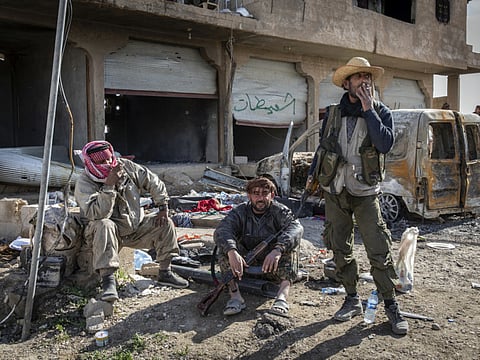Allies won’t remain in Syria after US exit
Trump faces growing criticism at home and abroad for ‘hasty’ pullout decision

Washington: As the deadline approaches for the withdrawal of US forces fighting Daesh in Syria, America’s closest European allies have turned down a Trump administration request to fill the gap with their own troops, according to US and foreign officials.
Allies have “unanimously” told the United States that they “won’t stay if you pull out,” a senior administration official said.
France and Britain are the only other countries with troops on the ground in the US-led coalition battling Daesh.
Along with the United States, they have provided training, supplies, logistics and intelligence for the Syrian Democratic Forces, the Kurdish-dominated group that has done most of the fighting.
US, French and British forces also man heavy artillery and conduct the airstrikes that have been decisive against the militants.
French Foreign Minister Jean-Yves Le Drian said last week that he was mystified by Trump’s policy.
On Tuesday, British Foreign Secretary Jeremy Hunt said “there is no prospect of British forces replacing the Americans” in Syria.
European refusal to stay unless President Donald Trump reverses at least part of his troop withdrawal order is one of several factors that US military officials, lawmakers and senior administration officials have said should make Trump think again.
Their concerns come as the administration has yet to reach an agreement with Turkey not to attack the SDF, which the nation says is a terrorist group.
President Recep Tayyip Erdogan has said the Turkish military, massed at the border, is prepared to move into northeastern Syria once the Americans leave.
One of the principal requests the administration has made of the allies, including Germany, which has no forces in Syria, is to form an “observer” force to patrol a 20-mile-wide “safe zone” on the Syrian side of the border, separating Turkey from the Syrian Kurds.
Officials in Ankara said Turkey’s defense minister, Hulusi Akar, and its military chief of staff will travel to Washington on Thursday to discuss Syria and other regional matters with acting Defense Secretary Patrick Shanahan.
The SDF has appealed for Western nations to keep a force of up to 1,500 in northeast Syria to coordinate air support and back its efforts to hold militants and other adversaries at bay. In anticipation of the departure of about 2,000 US troops, the Kurds are negotiating with Syrian President Bashar Al Assad and Russia, his primary foreign backer along with Iran.
Russia, meanwhile, has proposed that Assad’s forces simply be allowed to take over the entire area now controlled by the United States and its allies. “No one, including the Kurds and the Turks, thinks the regime coming into the northeast is a good idea,” the senior administration official said.
Trump has long complained that his own top aides and the military were blocking his determination to exit Syria once Daesh was defeated. In December, he said that the goal had been achieved and that US troops were leaving “now,” after which Defense Secretary Jim Mattis resigned.
Trump subsequently agreed that the departure would be “deliberate and orderly.”
The military is planning a full withdrawal by the end of April.
An unpopular decision
Military officials have repeatedly flagged what they see as the hazards of a hasty pullout, even after Daesh’s territorial presence has been eliminated.
Officials expect that the group will retain an insurgent capability and the potential to stage a comeback, like it did after the American departure from Iraq in 2011, and they estimate that between 20,000 and 30,000 militants remain in the two countries.
Senior officials, including Gen. Joseph Dunford, the chairman of the Joint Chiefs of Staff, have cautioned that the SDF requires ongoing assistance to stabilise cleared areas.
Last week, Votel said publicly that he did not support Trump’s withdrawal decision.
Graham, who leads a group of lawmakers opposed to the pullout plan, has proposed leaving 200 US troops in northeastern Syria as a way to incentivise European allies.
In a closed-door meeting at last week’s Munich Security Conference, Shanahan faced tough questions from congressional delegates who said he hadn’t articulated a substantive justification for Trump’s exit plans.
“Are you telling our allies that we are going to go to zero by April 30?” Graham asked Shanahan, according to an account Graham gave to Washington Post columnist Josh Rogin.
When Shanahan replied that those were the president’s order, Graham said he replied, “That’s the dumbest f--ing idea I’ve ever heard.”
Shanahan, he said, agreed that likely consequences included a return of Daesh, a Turkish attack on Kurdish forces and an advantage for Iran.



